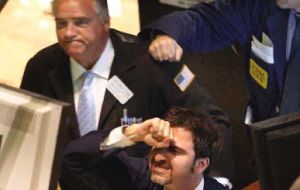MercoPress. South Atlantic News Agency
Wall Street below 7.000 benchmark drags global markets

Markets have fallen worldwide, rattled by fears that turmoil in the financial sector is far from over. On Wall Street, the US Dow Jones index fell below 7,000 points for the first time since October 1997.
In the UK, the FTSE 100 index briefly hit a six-year low. Markets elsewhere in Europe also fell sharply. Confidence was hit by a fresh 30 billion US dollars bail-out of US insurance giant AIG following a record 62 billion loss, and by HSBC's plans to raise ?12.5 billion. HSBC said the ?12.5 billion it is seeking to raise from shareholders to both shore-up its balance sheet and to grow through “targeted acquisitions”. The bank also said pre-tax profits for 2008 were ?6.5 billion, down 62% on the previous year after it wrote down the value of US assets by more than 10 billion US dollars. “The big issue [for markets] is the fact that HSBC - one of the biggest and strongest banks around - is having such problems,” said Jonathan Jackson and Killik & Co. “It's difficult to see any trigger for an upturn in the short term,” he added. Markets were also worried by the news coming from AIG. The firm reported a loss of 61.7 billion for the final three months of 2008 - the largest quarterly loss in corporate history - and said it would receive an extra 30 billion from the US government as part of a revamped rescue package. AIG has already received 150 billion US dollars in financial support - the biggest bail-out by far of any US company. The Federal Reserve and the Treasury said that AIG posed a “systemic risk” to the global financial system. “The potential cost to the economy and the taxpayer of government inaction would be extremely high,” they said. Weak manufacturing figures in both the UK and Euro-zone also placed downward pressure on European markets. The Purchasing Managers' Index (PMI), compiled by research group Markit, showed that manufacturing activity fell in February compared with the previous month. “Once again, the extreme weakness in manufacturing activity in February was widespread across the Euro-zone, with all countries seeing a very sharp contraction in activity,” said Howard Archer at IHS Global Insight. The figures were particularly badly received because manufacturing activity in both the UK and the Euro-zone rose slightly in January. By the end of trading, the UK's FTSE 100 was down 5.3%, Germany's Dax was 3.5% lower and France's Cac 40 had lost 4.7%. Earlier in Asia, Japan's Nikkei index closed down 3.8% at 7,280.15, and Hong Kong's Hang Seng index fell 3.9% Weak economic data from China and South Korea had underscored fears about Asia's export-dependent economies. China's manufacturing sector declined further last month, while South Korean imports and exports also slumped. Japan reported a steep drop in car sales. Monday's shares slide followed a poor performance on Wall Street on Friday after data showed that US economic growth was even weaker than thought. Latinamerican markets followed the world tendency with Argentina, Brazil and Mexico loosing the most. Argentina's Merval was down 7.63%; Brazil's Bovespa, 5.1%; Mexico's BMV, 4.61% and Chile's IPSA, 2.38%. Oil also suffered the impact of the deteriorating global economy and financial crisis with April contracts closing at 40.15 US dollars per barrel, which is 10.3% down from the previous week.




Top Comments
Disclaimer & comment rulesCommenting for this story is now closed.
If you have a Facebook account, become a fan and comment on our Facebook Page!